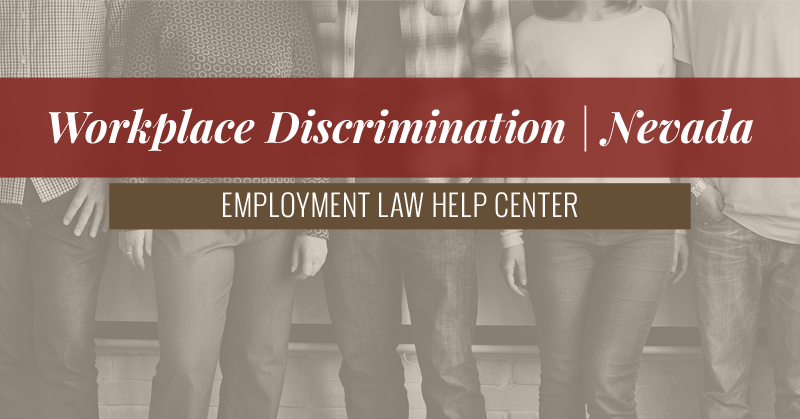Nevada Workplace Discrimination
Nevada anti-discrimination laws make it illegal for employers to make unfair employment decisions on the basis of race, sex, disability, national origin, color, and any other “protected characteristic,” and these laws apply to nearly every aspect of the employment relationship, including hiring, benefits, promotions, discipline and firing. Under Nevada law, victims of employment discrimination may be entitled to financial compensation for any damages associated with the discrimination, which they can pursue by filing a workplace discrimination claim against their employer. Contact a reputable Nevada employment discrimination lawyer today if you believe you have been treated unfairly at work because of your membership in a protected class.

Protected Characteristics in Nevada
Employment discrimination is defined as any adverse action by an employer based on the employee’s membership in a protected group, and this type of discrimination generally occurs when an employee or job applicant is treated unfairly on the basis of a protected characteristic, such as their:
- Religion
- Sex (including pregnancy and childbirth)
- Race
- National origin
- Color
- Genetic information
- Age
- Sexual orientation
- Use of service animal
- Gender identity or expression
- Disability
Companies in the United States with 15 or more employees are subject to Title VII, the primary federal law prohibiting workplace discrimination, the Americans with Disabilities Act, which prohibits disability discrimination, and the Genetic Information Nondiscrimination Act, which prohibits discrimination based on genetic information. Companies with 20 or more employees are subject to the Age Discrimination in Employment Act, which prohibits discrimination against employees aged 40 or older, and companies with four or more employees are subject to the Immigration Reform and Control Act, which prohibits discrimination based on citizenship status. Companies of all sizes are subject to the Equal Pay Act, which entitles men and women to equal pay for equal work. In Nevada, companies with 15 or more employees are subject to the state’s laws against discrimination at work.

Types of Employment Discrimination
Workplace discrimination can take place at any stage of the employment process, from hiring to firing, and anything in between, including any unfair employment decisions made in regards to wages, promotions, benefits, demotions and discipline. Some common examples of discriminatory treatment in the workplace include: being denied a promotion or other job-related benefits for discriminatory reasons; being harassed or abused at work because of your sex (sexual harassment); being forced to retire before you are ready; or being fired for discriminatory reasons. In addition to being a member of a protected group, in order to bring a discrimination claim against your employer, you must also be qualified for the job, promotion, or job-related benefit you were denied.
Contact a Knowledgeable Discrimination Lawyer in Nevada
The federal and state agencies responsible for enforcing anti-discrimination laws in Nevada are the Equal Employment Opportunity Commission (EEOC) and the Nevada Equal Rights Commission (NERC), and employees who believe they have an employment discrimination claim against their employer can file a complaint with either of these two agencies. You may also have grounds to file a workplace discrimination lawsuit against your employer, if you were discriminated against at work, and should you decide to take your claim to court, it’s a good idea to enlist the help of a qualified lawyer who has experience handling workplace discrimination claims in Nevada. Contact a knowledgeable employment law attorney today to discuss your legal options.




